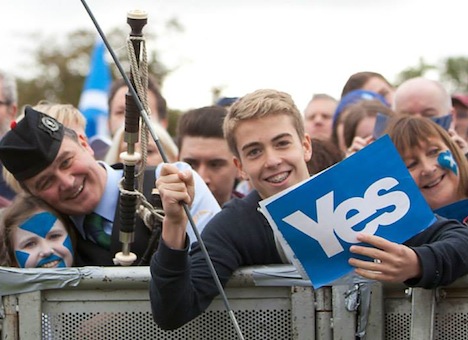
12. Scotland referendum on independence from UK, September 18.

Separatists from Québec to Barcelona will be watching Scotland’s historic vote on independence in the autumn, which could end over three centuries of union between Scotland and England, bringing the United Kingdom as we know it to an end.
Scottish nationalists, buoyed by the economic hopes of North Sea oil, have increasingly floated the idea of independence since the 1970s. Scotland’s rift with Tory prime minister Margaret Thatcher in the 1980s only alienated the country further from Westminster, and the election of Labour prime minister Tony Blair in 1997 led to the devolution of many Scottish domestic matters to a new regional parliament at Holyrood. Since 2007, the Scottish government has been led by the Scottish National Party (SNP) and first minister Alex Salmond. In the most recent May 2011 Scottish elections, the SNP was so popular that it won a majority government — a feat that the Scottish electoral system was specifically designed to avoid.
Salmond and his popular deputy first minister Nicola Sturgeon will lead the ‘Yes’ campaign for Scottish independence following the agreement that Salmond and British prime minister David Cameron struck in March 2013 on the referendum’s date and its terms. Proponents are likely to paint a vision of Scotland as an independent nation that has more in common with the Nordic welfare states than with Anglo-American capitalism. Though Scotland’s 5.3 million residents comprise just around 8.4% of the total UK population, Scotland has retained a proud and distinct culture and a discrete linguistic and intellectual tradition, and it veers politically to the left of England.
Cameron, the leader of the center-right Conservative Party, will help lead the ‘No’ campaign, which has already been christened the ‘Better Together’ campaign. But the relative unpopularity of Cameron and the Tories in Scotland means that he’ll need help from the centrist Liberal Democratic Party and the center-left Labour Party. In particular, Alistair Darling, the former Labour chancellor of the exchequer under prime minister Gordon Brown (both of whom are Scottish) is chairing the ‘Better Together’ effort. Although the ‘No’ campaign will try to convince Scots that they are, in fact, better off staying in the United Kingdom, it will also point to obstacles that an independent Scotland could face. Chief among those obstacles might be Scotland’s position in the European Union — although Scots are generally more pro-EU than their English counterparts, it’s not clear whether an independent Scotland would automatically join the European Union or would be forced to apply for readmission. Scotland would also face protracted negotiations with England (or perhaps the ‘United Kingdom of England, Wales and Northern Ireland’) over splitting the current UK debt burden, as well as defense, currency, immigration, citizenship and other myriad arrangements.
Polls show that Scottish voters today oppose independence — around 40% to 55% of voters would vote ‘No,’ and just around 25% to 35% would vote ‘Yes.’ But the campaigns won’t hit top speed until later in 2014 after the UK vote to elect members to the European Parliament.
Next: Brazil
![]()
![]()


